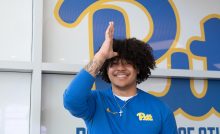Pitt looks for new athletic director to inherit evolving position
With a new athletic director on the way, Pitt’s athletic department could be in for a makeover.
The search to find the new leader of the athletic department began in December 2014, when Steve Pederson agreed to part ways with Pitt.
According to Randy Juhl, Pitt’s interim athletic director, the University will name a permanent director by June 30, the end of the University’s fiscal year, with the help of the search firm DHR International. But details have remained confidential, and Pitt’s sports information department has kept quiet and the same goes for the 14-member search committee, which is made up of Pitt coaches, student-athletes, administrators and faculty.
Athletic departments have taken on more responsibilities as college athletics grow in importance, leaning more and more on athletic directors as leaders rather than planners. Sports Illustrated writer George Dohrmann, who won a Pulitzer Prize in 2000 for his work uncovering academic fraud within the University of Minnesota’s basketball program, said hiring an athletic director now depends more on a candidate’s business background than anything else.
“An athletic department is essentially a huge multi-million dollar corporation that, if run properly, can generate tens of millions of dollars more per year than one that isn’t run properly,” he said. “It’s not good enough any more to be an alumni of the school or a beloved former coach or a longtime associate athletic director. You need to be a guy who really knows how to run a business.”
An athletic director’s success then relies on communication inside and outside of athletics, consistent fundraising and the development of a winning mentality across all sports.
Connee Zotos — a former athletic director with 20 years of experience in higher education — said athletic directors’ mindsets have changed since the start of her career.
“The motto in athletics, across the board, used to be, ‘My way or the highway,’” Zotos, now a professor of sports management at New York University, said. “Athletic departments almost used to find comfort in their isolation as a separate entity on campus. I think we’re seeing a shift in that thinking from athletic directors who don’t want to be in it alone any more, and they need help.”
According to Zotos, an athletic director is responsible for student-athletes, campus administrators, sponsors, alumni, media, boosters and many more “stakeholders,” as Zotos calls them. As more people become involved in the athletic department, an athletic director has to pay more attention to external factors — such as media, alumni and donors — instead of focusing solely on the operations within the athletic offices.
Alumni donations are a large part of an athletic department’s success. But with both increasing or decreasing at the same time, it’s hard to balance spending. A new head coach is a big investment, but one a succcessful team most likely doesn’t need, and a unsuccessful team can’t afford.
The National Bureau of Economic Research found in 2008 that an alumnus would donate between seven and eight percent more money per year after their school’s basketball or football team won its conference championship.
Juhl, who said he is not a candidate for Pitt’s athletic director job and plans to retire within a year, emphasized the importance of a healthy relationship between the next athletic director and Pitt alumni.
“[Alumni] are proud of having gone to Pitt, and [the athletic depatment] want to do nothing but to increase that source of pride for them,” he said. “We also need their support both in attendance and in donations in order to run a topflight department of athletics. There isn’t a single department in the country that doesn’t rely on support from alumni and friends in order to operate.”
In addition to the internal search committee, Pitt hired a Chicago-based search firm, DHR International, in February to help find candidates for the athletic director job. Dohrmann said a firm could help by using its exclusive contacts to provide schools with more information than a typical athletic department could acquire.
“If you’re paying a search firm, you’re paying them to know the insights or what skeletons are out there,” he said. “You want the firm to do the background that you don’t have the time or the resources to do.”
Dohrmann said a school’s typical payment to a firm for an athletic director search ranges from $30,000 to $90,000, but some schools have paid search firms much larger sums of money for assistance in the past.
According to Dohrmann, from 2005 to 2013, the University of Tennessee paid more than $360,000 to fill six different positions in athletics. North Carolina spent more than $255,000 on a search firm for only two months worth of work over a three year span from 2010 to 2013 for multiple positions. The University has not disclosed its payments to DHR International, and Ken Service, Pitt’s vice chancellor for communications, declined to comment on the amount.
Although athletic directors face different challenges now than they did years ago, Zotos said every school has a different opinion about what constitutes a successful athletic director.
“Every athletic department has its own character, and it starts a tradition based on past leadership,” Zotos said. “They’re such complex organizations that to try to give a blanket look at what an athletic director means at an institution is nearly impossible.”
Recent Posts
SGB addresses concerns about ICE presence on campus, hears SJP lawsuit against administration, approves governing code bill
At its weekly meeting on Tuesday at Nordy’s Place, Student Government Board heard concerns about…
ACLU of Pennsylvania sues Pitt over SJP suspension
The ACLU of Pennsylvania filed a federal civil lawsuit against the University of Pittsburgh and…
Marquan Pope: The ultimate shark
One of the most remarkable things about sharks is that an injury doesn’t deter them.…
Who Asked? // Do we really get a summer vacation?
This installment of Who Asked? by staff writer Brynn Murawski mourns the seemingly impossible perfect…
Notes From an Average Girl // Notes from my junior year
In this edition of Notes From an Average Girl, senior staff writer Madeline Milchman reflects…
Meaning at the Movies // The Power of the Movie Theater
In this edition of “Meaning at the Movies,” staff writer Lauren Deaton discusses her love…



